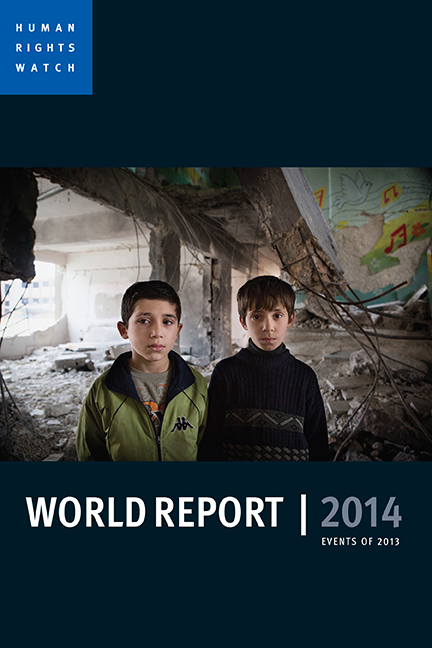Book contents
- Frontmatter
- Dedication
- HUMAN RIGHTS WATCH
- Table of Contents
- Foreword
- Rights Struggles of 2013: Stopping Mass Atrocities, Majority Bullying, and Abusive Counterterrorism
- The Human Rights Case for Drug Reform How Drug Criminalization Destroys Lives, Feeds Abuses, and Subverts the Rule of Law
- Putting Development to Rights: Integrating Rights into a Post-2015 Agenda
- The Right Whose Time Has Come (Again) Privacy in the Age of Surveillance
- Photo Essays
- AFRICA
- AMERICAS
- ASIA
- EUROPE AND CENTRAL ASIA
- MIDDLE EAST AND NORTH AFRICA
- UNITED STATES AND CANADA
- 2013 HUMAN RIGHTS WATCH PUBLICATIONS
- Acknowledgments
- Frontmatter
- Dedication
- HUMAN RIGHTS WATCH
- Table of Contents
- Foreword
- Rights Struggles of 2013: Stopping Mass Atrocities, Majority Bullying, and Abusive Counterterrorism
- The Human Rights Case for Drug Reform How Drug Criminalization Destroys Lives, Feeds Abuses, and Subverts the Rule of Law
- Putting Development to Rights: Integrating Rights into a Post-2015 Agenda
- The Right Whose Time Has Come (Again) Privacy in the Age of Surveillance
- Photo Essays
- AFRICA
- AMERICAS
- ASIA
- EUROPE AND CENTRAL ASIA
- MIDDLE EAST AND NORTH AFRICA
- UNITED STATES AND CANADA
- 2013 HUMAN RIGHTS WATCH PUBLICATIONS
- Acknowledgments
Summary
José Eduardo Dos Santos, Angola's president for the past 34 years, secured another five-year term in the August 2012 elections. Although the polls consolidated the control of the ruling Popular Movement for the Liberation of Angola (MPLA), the authorities intensified repressive measures to restrict freedom of expression, association, and assembly in 2013.
The government has pursued numerous criminal defamation lawsuits against outspoken journalists and activists, while continuing to use police abuse, arbitrary arrests, and intimidation to prevent peaceful anti-government protests, strikes, and other gatherings from taking place. The government also resumed mass forced evictions of informal settlements in 2013 and launched a new initiative to remove street traders in the capital, Luanda. Both measures affect Angola's poorest communities and have been conducted with brutality.
Freedom of Expression
Freedom of expression is severely restricted in Angola due to limited independent media, self-censorship, and government repression. Only 3 percent of the Angolan population has access to the Internet and social media, which are the main channels for commenting on government policies.
The authorities use criminal defamation laws to silence and intimidate journalists and bloggers. On July 5, bloggers José Gama and Lucas Pedro were charged with “abuse of press freedom” and defamation for articles published on the news website www.club-k.net, which is hosted outside of Angola. Brought by Angola's attorney general and the criminal investigation police director, the lawsuits are based on articles published between January and May that accused the attorney general of corruption and criminal investigation police officers of torture.
Between March and July, Rafael Marques, an investigative journalist and human rights defender who won the Transparency International Integrity Award in 2013, was charged with defamation in 11 criminal lawsuits. The plaintiffs are high-ranking generals, their business associates, and three private companies that operate in the diamond-rich Lunda Norte province. Marques accused the plaintiffs of involvement in torture, rape, and killings in a book he published in Portugal in 2011. Angola's Attorney General's office shelved a complaint filed by Marques against the generals and business associates in 2012, and has failed to investigate the allegations. Marques has regularly experienced threats, harassment, and pervasive surveillance, including apparently targeted hacker attacks on his computer and blog.
- Type
- Chapter
- Information
- World Report 2014Events of 2013, pp. 78 - 83Publisher: Bristol University PressPrint publication year: 2014



